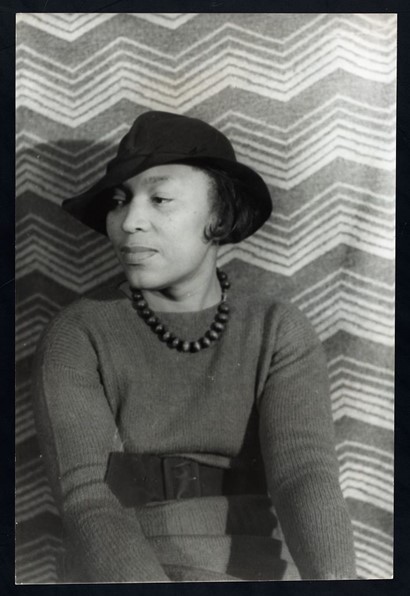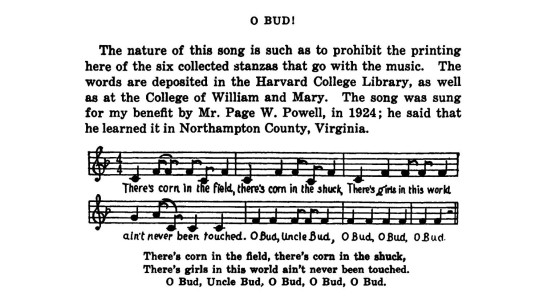#boozoo chavis
Explore tagged Tumblr posts
Text
On June 15, 1939 Zora Neale Hurston recorded "Uncle Bud," a bawdy song found all over the South that went on to become a Cajun-Creole Zydeco classic. Hurston explains, "'Uncle Bud' is not a work song. It is a sort of social song for amusement." One of the first documented instances of the song in print appeared as "O-Bud!" in a Texas Folklore Society publication in 1928, collected in Virginia ca. 1924, but Hurston likely first heard the song from black working men while she was doing folklore field work in logging and terpantine camps in Louisiana. It's an invaluable audible artifact from almost a century ago. And it's quite raunchy to say the least! At the end, either Stetson Kennedy or Hurbert Halpert, the Library of Congress folk collectors in that session, say with an audible grin, "I think that's a very valuable contribution to scientific recording."


#zora neale hurston#folklore#folk music#black history#music#music history#musicology#literature#african american literature#african diaspora#zydeco#cajun music#louisiana creole#boozoo chavis#rockin' sidney#sonny terry#Spotify
8 notes
·
View notes
Video
youtube
(via Paper in My Shoe - Boozoo Chavis (1990)
12 notes
·
View notes
Text
track 5, side 2 should be Boozoo Chavis.

0 notes
Video
youtube
Boozoo Chavis Paper In My Shoe (1954)
I got a paper in my shoe I got a paper in my shoe Oh what your mama don't know And what your papa don't mind Oh what your mama don't know And what your papa don't mind I got a paper in my shoe J'ai un papier dans mon soulier J'ai un papier dans mon soulier Pour ça ta maman connaît pas Et ça ton p��re veut pas Pour ça ta maman connaît pas Et ça ton père veut pas J'ai un papier dans mon soulier I got a paper in my shoe I got a paper in my shoe Oh what your mama don't know And what your papa don't mind Oh what your mama don't know And what your papa don't mind I got a paper in my shoe Oh don't you worry about your baby Oh don't you worry about your baby Oh don't you worry about your baby Oh don't you worry about your baby And what your mama don't know I got a paper in my shoe
3 notes
·
View notes
Video
youtube
5 notes
·
View notes
Photo


Marcel Dugas at El Sid-O’s Club & Boozoo Chavis at Richard’s Club © Rick Olivier
39 notes
·
View notes
Video
youtube
(via Boozoo Chavis | Paper in My Shoe)
6 notes
·
View notes
Video
VA – Bluesin' By The Bayou - Ain't Broke, Ain't Hungry : 50's 60's Texas Louisiana...
Label: Ace – CDCHD 1506 Series: Boppin' By The Bayou – 18 Format: CD, Compilation Country: UK Released: 2017 Support Strut Records, buy the album here : https://acerecords.co.uk/bluesin-by-t... Amzn (USA) : https://amzn.to/2lKZQ4I (affiliate) Amzn (UK) : https://amzn.to/2lU7FVu (affiliate)
Tracklist 1 – Leroy Washington - I've Been In This Prison 00:00 Written-By – Leroy Washington 2 – Lightnin Slim - Little Girl Blues 02:28 Written-By – Jerry West 3 – Ramblin' Hi Harris - I Haven't Got A Home 05:26 Written-By – J.D. Miller 4 – Honey Boy Allen - Better Start Doin' It 08:29 5 – Slim Harpo - Cigarettes 10:28 6 – Polka Dot Slim - Ain't Broke, Ain't Hungry 12:40 7 – Joe Richards - Dreaming Dreaming 15:45 Written-By – Joe Richards 8 – Cookie And The Cupcakes - In The Evening 18:12 Written-By – George Khoury, Huey Thierry 9 – Jake Jackson - Life Gets Hard 21:02 Written-By – J.D. Miller, Jake Jackson 10 – Boozoo Chavis & His Zodico Accordian - Tee Black 23:43 Written-By – Boozoo Chavis, Roosevelt Griffin 11 – Clarence Garlow - Make Me Cry 25:52 Written-By – Clarence Garlow 12 – Lightnin Slim - I Hate To Leave You Baby 28:42 Written-By – J.D. Miller, Otis Hicks 13 – Ramblin' Hi Harris - Baby, Baby, Baby 31:38 14 –Lightnin Slim - Don't Know 34:24 Written-By – J.D. Miller, Otis Hicks 15 – Jake Jackson - Somebody Tell Me 36:30 Written-By – J.D. Miller, Jake Jackson 16 – T.B. Fisher - Don't Change Your Mind 39:32 Written-By – Huey Meaux, Mac Rebennack 17 –Unknown Artist - I'm Gonna Find My Baby 41:36
5 notes
·
View notes
Photo

Now you can get Boozoo Chavis’ biggest hits, like ‘Paper In My Shoe’, ‘Hamburgers And Popcorn’ on one great record!
1 note
·
View note
Photo





So, just down the alley is my kind of place; Roux 45 a shop specializing in vinyl records. Mmmmm-hmm. And does this place have all the greats. Blind Lemon, Bessie Smith, Boozoo Chavis, Muddy Waters. Shopkeep is friendly too, goes by Gumbo Sid. Apparently he's a five time all around Gumbo champion and used to play bass guitar back in the day. I don't want to seem like I'm stalking Rene Monroe, but...I'm stalking Rene Monroe. Still no autograph. Dang it. Excuse me, Ma'am, ya'll should look where you're going. I was properly distracted with Mr. Monroe. Whoa, such language! Well, excuuuse me!
0 notes
Text
angelo badalamenti
george balanchine
devendra banhart
thomas barlett
fontella bass
isabel bayrakdarian
beaver & krause
leonard bernstein
malcolm bilson
iva bittová
blakroc
twoyearoldbear
diablo
chris miles
foolish cult
the blind boys of alabama
afel bocoum
william bolcom
bombino
boston camerata
boston symphony chamber players
billy bragg
tyondai braxton
von's island
docXyn
jon brion
buena vista social club
t bone burnett
ken burns
carter burwell
amber bylsma
david byrne
don byron
john cage
calliope
camille
carolina chocolate drops
elliott carter
olivia chaney
rhys chatham
boozoo chavis
guy clark
shawn colvin
paolo conte
contemporary chamber ensemble
ry cooder
jacob cooper
bruno coulais
christiana courtin
teresa cristina
rodney crowell
NxxxxxS
george crumb
czechoslovak brass orchestra
michael daves
nataly dawn
jan degaetani
georges delerue
jeremy denk
donnacha dennehy
toumani diabaté
fatoumata diawara
0 notes
Photo

FROM TEXAS TO CALIFORNIA
Songs Of and By Charles Brown
Charles Brown (1922-1999) was both an outstanding dulcet-toned blues singer and a superlative pianist who was a key figure in the 1940's development of the style known as west coast blues.
He began his recording career as a member of Johnny Moore's Three Blazers whose memorable line-up was Charles on vocals and piano, Johnny Moore on guitar and Eddie Williams on bass.
Their first real success was with DRIFTING BLUES also known as
DRIFTIN' BLUES and WALKING AND DRIFTING.
https://youtu.be/fUyC2l--fSw
The song was written by Charles but credited not only to him but also Messrs. Moore and Williams. Recorded in September 1945, it became a #2 R&B hit in '46 on Philo, Eddie and Leo Mesner's Los Angeles-based label, the name of which was swiftly changed to Aladdin. Johnny Moore was the brother of Oscar Moore, guitarist with The King Cole Trio.
DRIFTIN' BLUES remains one of the most revived blues songs and among other artists who released their own versions over the years were��Chuck Berry, The Paul Butterfield Blues Band, Bobby 'Blue' Bland, Ray Charles, Boozoo Chavis, Eric Clapton, Clifton Chenier, Sam Cooke, Snooks Eaglin, Billy Eckstine with Count Basie, Lowell Fulson, John Hammond, John Lee Hooker, Albert King, B.B. King, Little Walter, John Mayall, The Steve Miller Band, Della Reese and Pete Townshend.
Other successful songs recorded by Johnny Moore's Three Blazers featuring Charles Brown included NEW ORLEANS BLUES (in 1947 on Exclusive Records and written by Leon Rene, Exclusive's owner) https://youtu.be/EvZe6RSBqQY and MERRY CHRISTMAS BABY, also on Exclusive in '47, written by Charles but officially credited only to Lou Baxter and Johnny Moore. https://youtu.be/FCVjY4qAiy8 MERRY CHRISTMAS BABY is another major copyright boosted by cover versions by such as Otis Redding, Elvis Presley, B.B. King, Rod Stewart, Sheryl Crow and Bruce Springsteen.
In 1948, Charles was signed as a solo artist on Aladdin and logged up a series of R&B best-sellers including GET YOURSELF ANOTHER FOOL (Edward Mitchell) (#4 in '48), https://youtu.be/sYVIyA9Z7Ds TROUBLE BLUES (Charles Brown) (#1 in '49) https://youtu.be/cZWs_dUqIrI , IN THE EVENING WHEN THE SUN GOES DOWN (Traditional) (#4 in '49), HOMESICK BLUES (Charles Brown) (#5 in '49), MY BABY'S GONE (Charles Brown) (#6 in '50), BLACK NIGHT (Jessie Mae Robinson) (#1 in '51), https://youtu.be/-71jfEwX-xQ and SEVEN LONG DAYS (Jessie Mae Robinson) (#2 in '51). Another important Charles Brown copyright is PLEASE COME HOME FOR CHRISTMAS (Charles Brown/Gene Redd) which he first recorded for King in 1960.
The Door To Yesterday is proud to present a new podcast containing an interview that I recorded in 1991 with Charles which was edited by Andrew Mackenzie as a promotional sampler for EMI Music Publishing.
Charles had been appearing at the Hollywood Roosevelt Hotel and I invited him to help me put together a sampler to promote both his own compositions and recordings that he made over the years of other writers' songs. The interview took place in EMI Publishing's studio on Sunset Boulevard with Charles seated at the piano. In addition to the extracts that I play from original records, he sang and played live.
The sampler includes the following songs: DRIFTIN' BLUES (Charles Brown/Johnny Moore/Eddie Williams), IF I HAD YOU (Ted Shapiro/James Campbell/Reginald Connelly), AGAIN (Lionel Newman/Dorcas Cochran), PLEASE DON'T DRIVE ME AWAY (Charles Brown/Jesse Ervin), HONEY SIPPER (Charles Brown/Linda Woodward), THAT OLD FEELING (Sammy Fain/Lew Brown), I'M SAVING MY LOVE FOR YOU (Charles Brown), BLACK NIGHT (Jessie Mae Robinson), TROUBLE BLUES (Charles Brown), SEVEN LONG DAYS (Jessie Mae Robinson/Charles Brown), BAD BAD WHISKEY (Amos Milburn), THE MESSAGE (Clarence Landry) and DRIFTIN' BLUES (Charles Brown/Johnny Moore/Eddie Williams).
Here's a link to the complete podcast:
https://we.tl/t-nKKAWgBFic
EMI Music Publishing is now part of Sony/ATV and Capitol Records is now owned by Universal Music Group; the references I made during the interview both to EMI and to Capitol reflect the ownership of those companies in 1991.
Charles was just one of a number of highly influential Texas-born bluesmen.
Here are a few tracks reminding us of some of the others...
BLUES AFTER HOURS
(Pee Wee Crayton)
by Pee Wee Crayton
(Modern: 1948)
https://youtu.be/IXaAcPFLozY
CALL IT STORMY MONDAY (But Tuesday Is Just As Bad)
(Aaron Walker)
by T-Bone Walker
(Black And White: 1947)
https://youtu.be/98MeVUjqyTo
FROSTY
(Albert Collins)
by Albert Collins (Hall: 1965)
https://youtu.be/wrfOpXApxYQ
HIDE AWAY
(Freddy King/Sonny Thompson)
by Freddy King
(Federal: 1961)
https://youtu.be/eEuvfM9c3yY
I QUIT MY PRETTY MAMA
(Ivory Joe Hunter/Lois Mann)
by Ivory Joe Hunter
(King: 1950)
https://youtu.be/5ihiTrYRQDU
ROOMIN' HOUSE BOOGIE
(Jessie Mae Robinson)
by Amos Milburn
(Aladdin: 1949)
https://youtu.be/5UMHjn1Gr70
0 notes
Video
youtube
6 notes
·
View notes
Text
Genre of the day:Zydeco
Zydeco is an uptempo dance music that mixes the traditional folk styles of southwest Louisiana with the sounds of early, African-American Rhythm & Blues, Blues, Jazz, and Gospel performers. The first recordings were in the late 1920s, but the style gained popularity in the 50s with Clifton Chenier and Boozoo Chavis. As in Cajun music, the dominant instrument is the accordion, but Zydeco often adds bass guitar, horns, and keyboards to the mix. By the 1940s, the use of rub-boards (aka "washboards" or "frottoirs") had become a popular part of the Zydeco sound and the instrument is ubiquitous in modern Zydeco bands.
0 notes
Text
Anytime favorite music from Black Sabbath, The Meters, Pantera, Jimmy Martin, Iron Maiden, and Boozoo Chavis
0 notes